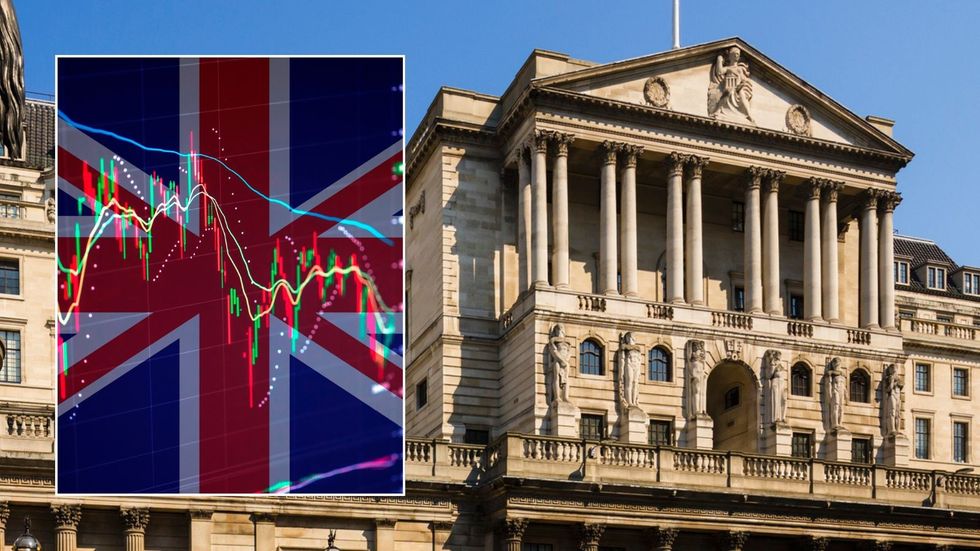Savers are being hit with falling interest rates
GETTY
The central bank has slashed the base rate which is affecting what savings accounts have on offer
Don't Miss
Most Read
Trending on GB News
Savers are being hit with a "significant fall" in interest rates attached to accounts, according to new research conducted by Moneyfactscompare.
Following recent rate hikes from the Bank of England, savings accounts from high street banks and building societies have been competitively high
As it stands, there are just over 1,600 accounts that beat inflation which remained unchanged at 2.2 per cent for the 12 months to August.
Currently, the central bank's modal projection rate for the consumer price index (CPI) during the third quarter of 2025 is 2.4 per cent.
For September 2023, there were no account deals that beat 6.7 per cent, which was the CPI rate for August 2023, and in September 2022, there were no deals that beat August 2022's rate of 9.9 per cent.
Analysts are urging bank customers to prepare for savings rates to be cut further in the months ahead.
Do you have a money story you’d like to share? Get in touch by emailing money@gbnews.uk.
 Savings interest rates are being cut following recent actions from the Bank of England GETTY
Savings interest rates are being cut following recent actions from the Bank of England GETTY Here is a list of the top savings accounts currently on the market, based on type:
- Easy access account: Ulster Bank – 5.20 per cent interest rate
- Notice account: DF Capital – 5.13 per cent (90-day) interest rate
- One-year fixed rate bond: Mizrahi Tefahot Bank Ltd– five per cent interest rate
- Two-year fixed rate bond: Ziraat Bank (Raisin UK) – 4.83 per cent interest rate
- Three-year fixed rate bond: UBL UK – 4.72 per cent (payable on maturity) interest rate
- Four-year fixed rate bond: UBL UK – 4.54 per cent (payable on maturity) interest rate
- Five-year fixed rate bond: UBL UK – 4.64 per cent (payable on maturity) interest rate.
Here is a list of the top ISA accounts currently on the market, based on type:
- Easy access ISA: Trading 212 – 4.93 per cent interest rate
- Notice ISA: West Brom Building Society – 4.85 per cent (60-day) interest rate
- One-year fixed rate ISA: Punjab National Bank (International) Ltd – 4.80 per cent interest rate
- Two-year fixed rate ISA: UBL UK – 4.51 per cent (payable on maturity) interest rate
- Three-year fixed rate ISA: UBL UK – 4.50 per cent (payable on maturity) interest rate
- Four-year fixed rate ISA: UBL UK – 4.30 per cent (payable on maturity) interest rate
- Five-year fixed rate ISA: UBL UK – 4.45 per cent (payable on maturity) interest rate.
Caitlyn Eastell, a spokesperson at Moneyfactscompare.co.uk, said: "The majority of top rates have seen significant falls since the previous inflation announcement, with fixed ISA and non-ISA accounts taking the biggest hits.
"Providers have been busy passing on the reduction in interest rates to their savings deals, so it would be wise to grab a market-leading rate while there are still some sitting around the five per cent mark.
LATEST DEVELOPMENTS:
 Earlier this year, the Bank of England voted to cut interest ratesGETTY
Earlier this year, the Bank of England voted to cut interest ratesGETTY "Fixed bonds are continuing to follow a downward trend, particularly one-year fixed bonds and their ISA counterparts. Savers can now expect to lose out on over one per cent less interest than the leading rate in September 2023.
"Longer-term bonds have seen less drastic cuts; however, they are still worse off month-on-month. The gap between shorter- and longer-term savings is slowly beginning to close.
"Savers can receive a better return for a one- or two-year term but if they wish to beat inflation for longer it may be worth considering fixed bonds with a term of three or more years.
"Despite the reduction in the Bank of England base rate last month variable accounts have been under the spotlight but there are still some competitive accounts out there."








